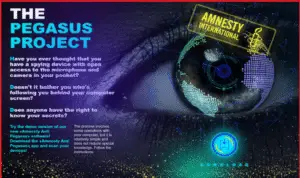Rahul Gandhi Alleges Pegasus 2.0 Surveillance, Sparks Fresh Political Storm
New Delhi, July 13, 2025 — Congress leader Rahul Gandhi has once again brought the controversial Pegasus 2.0 surveillance issue into the spotlight. He claimed that a more advanced version of Pegasus 2.0 surveillance system is being used by the government agencies to spy on opposition leaders, journalists, and activists across India.
During a press briefing held in New Delhi, Rahul Gandhi accused the ruling BJP government for “weaponizing surveillance” to crush opposition and manipulate the democratic processes. He further mentioned that “The government has not just failed to answer the old questions on Pegasus, but it is now allegedly using Pegasus 2.0 surveillance to monitor citizens, especially those who pointing fingers towards the functioning of ruling party and those who dare to speak against the system.
What Is Pegasus 2.0 Surveillance Software?
The original Pegasus spyware has been developed by an Israeli cyber-intelligence firm named NSO Group Technologies . The word NSO stands for Niv, Shalev and Omri, who were the company’s founders. Pegasus 2.0 software is capable of infiltrating smartphone through zero-click vulnerabilities. This software can access encrypted apps, activate microphones, and extract real-time data without users interaction. Special features of this spyware software make it virtually undetectable. This spyware is classified as a weapon by Israel.
There is no official confirmation about the existence or use of Pegasus 2.0’s in India. However, Rahul Gandhi claims that multiple opposition members have experienced suspicious tampering of their devices and also demanded a Supreme Court-monitored investigation into the matter.
Allegation & Response of Political Party:
Rahul Gandhi’s allegations have already triggered sharp responses across party lines. Union Home Minister Amit Shah dismissed the claims as “baseless and politically motivated.” He accused the Congress of trying to divert attention from its internal struggles.
Several opposition parties including TMC, AAP, and the Left have rallied behind Rahul Gandhi. They also demanded transparency and answers in Parliament during the upcoming monsoon session begins next week.
Senior Congress leader Jairam Ramesh further added, “This is not about party politics. It’s about democracy, privacy, and the constitutional rights of Indian citizens.”
Demand for Independent Probe and Data Privacy Law
This controversy has also reignited demands for a comprehensive data protection law in India. Although a draft bill is currently under consideration, digital rights activists are urging the government to pass legislation that clearly defines the limits of surveillance.
Cybersecurity analysts have urged the government to conduct an independent digital forensic audit of affected devices and a legal framework that upholds the right to privacy as mandated by the Supreme Court.
Anuja Kulkarni, a data privacy researcher said “This isn’t just a political issue. It’s a technical and constitutional issue.” He further added “We need a legal framework that can keep pace with the rapidly advancing world of spyware.”

International Attention on the issue
This isn’t the first time India has come under the scanner for surveillance practices. International organisations like Amnesty International and Reporters Without Borders have already raised concerns over India’s digital surveillance policies in the past. The emergence of Pegasus 2.0 allegations has once again drawn global attention over India’s approach to privacy and freedom of the press.
Conclusion
Rahul Gandhi’s Pegasus 2.0 surveillance allegation has reopened a deeply contentious chapter in Indian politics. As the monsoon session approaches and pressure mounts from both civil society and the opposition, the government will likely face intense scrutiny in the coming days.
Whether the claims lead to meaningful accountability or are buried under political rhetoric remains to be seen. However, one thing is clear that the battle over digital surveillance in India is far from over.
FAQs on Pegasus 2.0 Surveillance Allegation by Rahul Gandhi
What is Pegasus 2.0 surveillance?
Pegasus 2.0 surveillance refers to the alleged use of an upgraded version of the original Pegasus spyware, which reportedly offers more advanced spying capabilities, including accessing encrypted apps and real-time data extraction without user interaction.
Who made the Pegasus 2.0 surveillance allegation?
Congress leader Rahul Gandhi made the accusation during a press conference on July 13, 2025, claiming the Indian government is using Pegasus 2.0 to spy on opposition leaders, journalists, and activists.
Has the government responded to the allegations?
Yes. Union Home Minister Amit Shah called the allegations “baseless and politically motivated,” denying any misuse of surveillance tools by the government.
What evidence did Rahul Gandhi provide regarding Pegasus 2.0?
While specific technical evidence wasn’t publicly shared, Gandhi stated that several opposition leaders’ phones showed signs of tampering and surveillance, and called for an independent investigation.
What makes Pegasus 2.0 different from the original Pegasus spyware?
Pegasus 2.0 is believed to have enhanced capabilities, including improved stealth operations, real-time data access, encrypted app monitoring, and even remote camera and mic activation without any user awareness.
Has there been any official investigation into Pegasus 2.0?
As of now, no official probe into Pegasus 2.0 has been announced. However, opposition parties are demanding a Supreme Court-monitored investigation into the surveillance claims.
How has the opposition reacted to the Pegasus 2.0 claims?
Parties like the TMC, AAP, and the Left have backed Rahul Gandhi, demanding government accountability and a full investigation into the alleged use of surveillance software.
What is the status of India’s Data Protection Bill in light of these allegations?
The Data Protection Bill is still pending final approval. Digital rights activists are urging the government to expedite it and include safeguards against illegal surveillance practices.
Is international media covering the Pegasus 2.0 issue?
Yes. Global media outlets and rights groups are closely monitoring the situation, with renewed focus on India’s surveillance policies and press freedom.
What could be the political impact of the Pegasus 2.0 surveillance controversy?
The allegations could dominate the upcoming monsoon session in Parliament, intensify opposition unity, and further polarize the political narrative leading up to the 2026 general elections.




